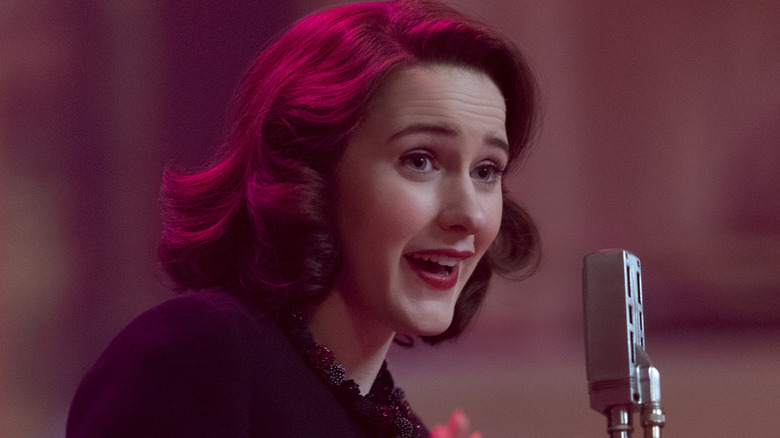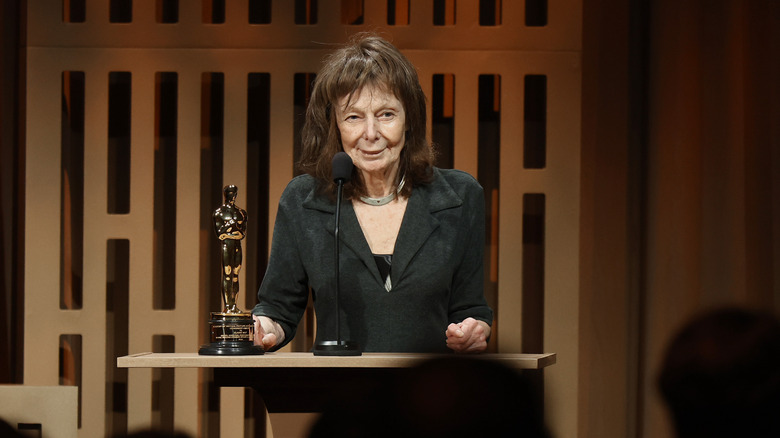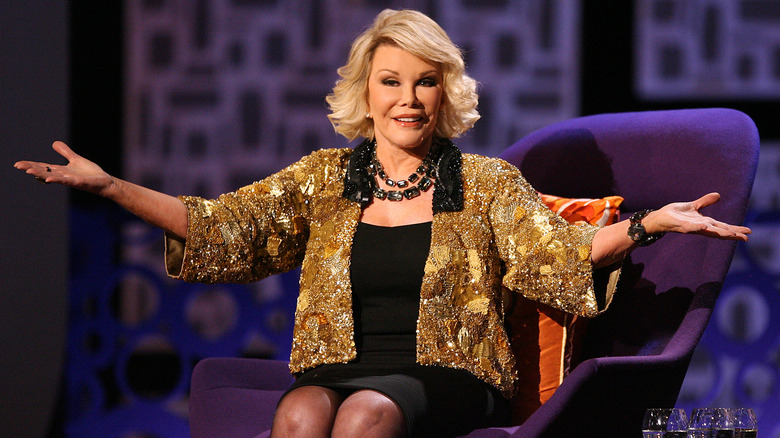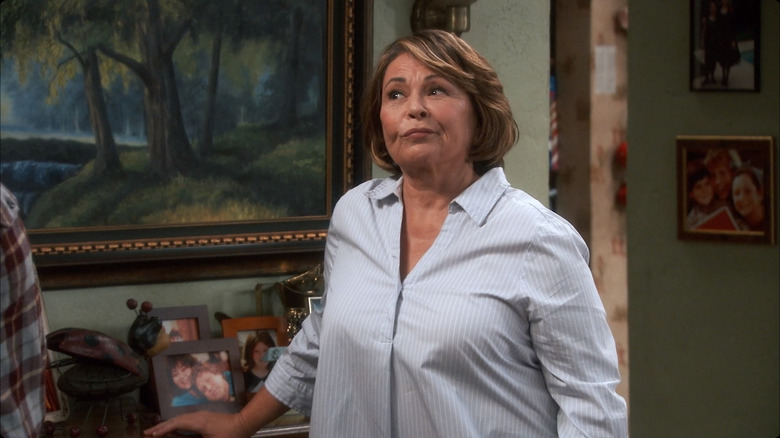The Funny Women Who Inspired Marvelous Mrs. Maisel's Midge
The 5th and final season of Amazon Prime's "The Marvelous Mrs. Maisel" has, naturally, most of the characters' arcs coming to a head. Most specifically, we see through a series of flash-forwards that Midge Maisel (Rachel Brosnahan) does indeed make it, becoming one of the biggest stars in the comedy world. Though it clearly comes with the price of a tumultuous love life, an alienated family, and a severed friendship with her close friend and manager Susie (Alex Borstein).
Back in the 1960s, however, Midge is still trying to get ahead, a doubly challenging task given the amount of sexism, condescension, and just plain old "girls aren't funny" dismissal she faces. There is a clear tip of the hat to the struggles women had to — and, to a significant degree, still have to — endure to make it in the worlds of entertainment and comedy.
Creator Amy Sherman-Palladino naturally put a lot of her own experience into that of Midge. Speaking with Vanity Fair right as "The Marvelous Mrs. Maisel" was making its debut, she spoke about the large amount of research she and her writing team were doing. "But for the pilot, I knew who this girl was," she said. But there's also the experience of many of her pop culture inspirations, in particular the other women who came before her in the comedy world. In March of 2023, she spoke with Entertainment Weekly and mentioned a few of them.
Elaine May
"Elaine May is one of the all-time geniuses," Amy Sherman-Palladino told EW, "far even beyond her Nichols and May moments." May, the comedian, writer, and actor, is probably one of the many female writers who don't really get their due in Hollywood. Starting out in improvisational comedy with her creative partner Mike Nichols, May has contributed to some of the most influential comedic film and television programs in the 20th century. She performed on "The Tonight Show with Jack Paar," "The Smothers Brothers Comedy Hour," and co-wrote, with Warren Beatty, the nine-time Academy Award-nominated 1978 film "Heaven Can Wait." She even contributed to the script for "Tootsie," though went uncredited at the time. And there is an undeniable similarity between May's dialogue and the rapid-fire witticisms of Midge and her family.
Sherman-Palladino even defended May's 1987 adventure-comedy "Ishtar" in her interview with Entertainment Weekly. May wrote and directed the film, which was nother collaboration with Warren Beatty, starring both him and Dustin Hoffman. It was an absolute disaster at the box office, and for a long time was considered one of the worst films ever made. "The few movies that she directed — I'm even going to say if people could give 'Ishtar' one more look because there's some damn funny s— in 'Ishtar.' She was absolutely brilliant," Sherman-Palladino said. And indeed, in the 35 years since its release, there has been a strong critical reappraisal of "Ishtar."
Though it was the last film she directed, Elaine May has continued to write, and even occasionally perform. In 2022, the Academy presented her with an honorary Oscar for her unique contributions to film, television, and comedy.
Joan Rivers
This may be the most obvious influence in Midge's story, or at least its post-success denouement. "Joan Rivers, my God who was better than Joan Rivers?" Amy Sherman-Palladino said to EW. Like Midge, Joan Rivers was from a comfortable Jewish family in New York and was divorced before setting out on her career as a comedian. Like Midge, she performed at the beatnik-centric Gaslight Cafe when she was just getting started. She was also influenced by Lenny Bruce (though never had a fling with him as Midge does in "Maisel"). Like Midge, she got a significant break writing for and eventually performing on late-night talk TV. And like Midge, she became wildly successful and unafraid to flaunt it, though had far from smooth sailing in her personal life.
Sherman-Palladino is absolutely correct, though, that there aren't many bigger legends in comedy — regardless of gender — than Joan Rivers. "That library card joke Joan Rivers did on Johnny Carson is maybe the best joke I've ever heard in my entire life," she told EW. For those unfamiliar, we could tell that joke ourselves, but it's probably better for viewers to see it for themselves.
It's almost a throwaway line, as if she were saying it on the way to a bigger punchline, but it has the audience, and Johnny Carson in such stitches that she has to pause. "It's so smart and it says everything about her," said Sherman-Palladino, "and the world of men and women, in one short, great joke."
Roseanne Barr
Viewers who have been around long enough will know that, before her drift into dodgy tweets, and before she was sacked from the reboot of her eponymous sitcom, Roseanne Barr's "Roseanne" was one of the most popular shows on primetime in the late 1980s and 90s. It was also Amy Sherman-Palladino's first television writing gig, even before she added the Palladino to the Sherman. She and writing partner Jennifer Heath were asked to join the writers' room in 1993.
Sherman-Palladino doesn't just credit Barr herself with influencing her, but much of the rest of the cast, which was praised for centering strong female characters. Likewise, the writing made sure to highlight that same perspective. "I had Laurie Metcalf, Sara Gilbert, just a smorgasbord of really sharp, smart women's voices to cut my teeth on," she told EW. "I'm forever grateful that was my first job — starting there where the focal point was, 'What's a woman thinking? What's funny in this scenario being a wife or a mother?'"
Sherman Palladino contributed to 37 episodes in Seasons 5 and 6 of "Roseanne." This included the Season 4 episode "A Bitter Pill to Swallow," in which Becky (Lecy Goranson) asks her Aunt Jackie (Metcalf) for advice on birth control. It was a groundbreaking episode and earned both Heath and Sherman-Palladino an Emmy nomination.



